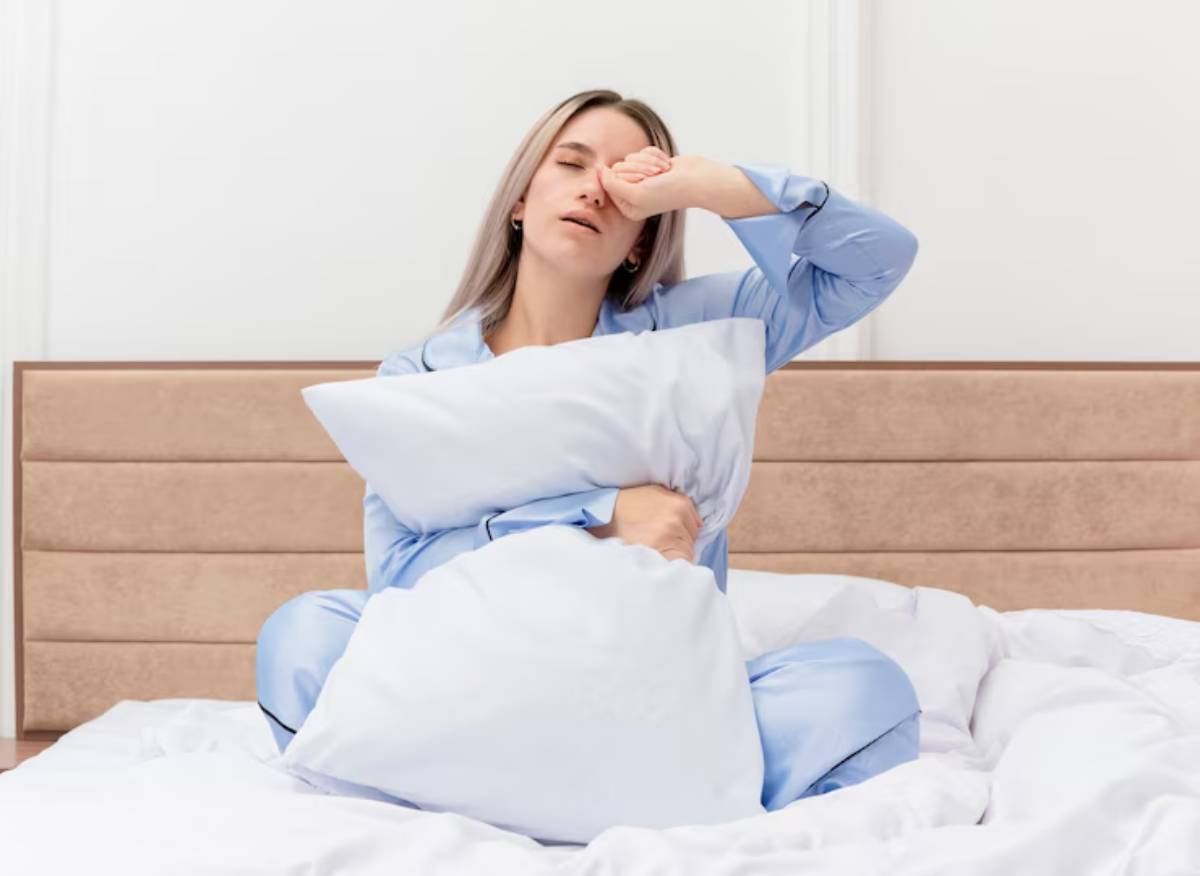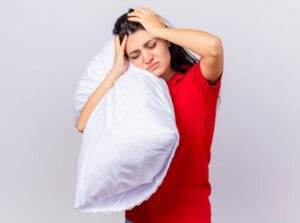The Health Blog

Hormonal Changes and Sleep: Natural Remedies
You know that feeling when everything’s quiet, the bed’s comfy, the lights are low… and yet, your brain decides now’s the perfect time to host a 3 a.m. thought parade?
Yeah. That.
For many, sleep starts to get shaky not because of stress or late-night caffeine — though those don’t help — but because of shifts happening inside the body. Hormonal ones. Quiet, steady changes that influence everything from mood to metabolism… and especially sleep.
Here’s the thing: hormones don’t just control reproduction or energy levels. They’re deeply tied to our sleep-wake cycle — when we feel tired, how deeply we rest, and how easily we stay asleep.
And when those hormones go off script? That’s when hormonal sleep disturbances begin to show up.
First, How Hormones Affect Sleep

Hormones are messengers. They help your body communicate with itself. When it comes to sleep, a few key players take the spotlight:
Melatonin
The famous one. It helps signal to your brain when it’s time to wind down. Its production increases as it gets dark — unless screens or bright lights get in the way.
Cortisol
Known as the “stress hormone,” cortisol should be highest in the morning to wake you up and lowest at night to let you sleep. But when it stays high in the evening? Goodbye, rest.
Estrogen and Progesterone
These shift dramatically during menstruation, perimenopause, and menopause. Progesterone is calming — like nature’s chill pill. Estrogen supports REM sleep. When either drops, sleep can become light, fragmented, or just plain elusive.
Testosterone
Though often overlooked, testosterone also plays a role in deep sleep — for all genders. A decline (common with age) can mean less restorative rest.
Thyroid Hormones
Too much or too little thyroid activity can lead to insomnia, restlessness, or constant fatigue.
Now, imagine any of these hormones falling out of sync — even slightly. It’s no wonder sleep and hormones are so tightly linked.
Signs You’re Experiencing Hormonal Sleep Disturbances

How do you know your sleep issues are hormone-related and not just a random phase?
Here are some clues:
- Trouble falling asleep around menstruation or ovulation
- Frequent night sweats or hot flashes
- Waking up at 3–4 a.m. with anxiety or a racing heart
- Restless sleep during perimenopause or menopause
- New-onset insomnia without obvious stressors
- Feeling wide awake at night and groggy in the morning
- A history of thyroid issues or adrenal fatigue
Of course, other things can cause sleep issues too. But if these patterns are familiar, hormones might be playing a bigger role than you think.
Natural Remedies to Support Hormonal Sleep Balance

Here’s the heart of it. You don’t have to power through sleepless nights with a shrug. You also don’t need a cabinet full of pills to find relief. These natural hormone balance strategies are gentle, grounded, and designed to help your body find its rhythm again.
1. Balance Blood Sugar First
This might sound unrelated, but stabilising your blood sugar is one of the most powerful ways to balance hormones — and therefore improve sleep.
Why? Because blood sugar spikes and crashes mess with cortisol and insulin, both of which directly affect melatonin and overall rest.
Tips:
- Eat protein and healthy fats with every meal
- Avoid refined sugar and white carbs late in the day
- Don’t skip meals — especially breakfast
- If you need a snack before bed, go for something light and protein-based (e.g., a boiled egg or almond butter on whole grain toast)
Stable blood sugar means a calmer body. And a calmer body sleeps better.
2. Support Natural Melatonin Production
Instead of jumping straight to melatonin supplements, try helping your body make more of it naturally.
How?
- Get bright light in the morning (ideally within 30 minutes of waking)
- Limit screen exposure and bright overhead lights after sunset
- Dim lights an hour before bed — use warm tones or candles
- Stick to a regular bedtime, even on weekends
Melatonin isn’t just a pill. It’s a process. Give your body the tools it needs, and it’ll often do the rest.
3. Soothe Cortisol With Evening Rituals
If you’re wired at night — tired but mentally racing — chances are your cortisol is peaking at the wrong time.
Try this:
- Do something slow and repetitive before bed (puzzles, knitting, folding laundry)
- Sip herbal tea like ashwagandha, lemon balm, or passionflower
- Take a warm Epsom salt bath (the magnesium helps relax muscles and calm the nervous system)
- Use breathing exercises — like 4-7-8 or box breathing — to slow your heart rate
Even 15 minutes of quiet time can shift your cortisol curve. Over time, the body begins to trust it’s safe to rest.
4. Herbal Helpers for Hormonal Sleep Disturbances
Sometimes, nature lends a hand — and the right herbs can be powerful allies for hormone-related sleep struggles.
Helpful herbs include:
- Vitex (Chasteberry): Balances progesterone and eases PMS or perimenopausal insomnia
- Ashwagandha: Lowers cortisol, reduces stress, supports thyroid function
- Black cohosh: Useful for menopause-related hot flashes and night sweats
- Maca root: Helps with overall hormone regulation, energy, and mood
- Valerian root and passionflower: Traditional sleep aids that calm a racing mind
Always consult with a healthcare provider or herbalist — especially if you’re on medication or managing other conditions. Herbs are powerful, and each person’s needs are different.
5. Eat to Fuel Hormone Production
Your body needs raw materials — nutrients — to make hormones. Without them, everything gets sluggish, including sleep regulation.
Try adding more:
- Healthy fats (avocados, olive oil, nuts, seeds)
- Leafy greens (for magnesium, calcium, and B vitamins)
- Cruciferous veggies like broccoli and cauliflower (they help clear excess estrogen)
- Protein (helps with hormone repair and production)
- Omega-3s (from salmon, flaxseeds, or walnuts)
Food isn’t just fuel. It’s information for your hormones.
6. Track Your Cycle (or Sleep Patterns)
If you’re menstruating, your sleep needs and hormone levels shift week to week. Understanding those patterns gives you power.
Quick guide:
- Follicular phase (after period): Energy rises, sleep is often better
- Ovulation: Sleep may be lighter, temperature slightly higher
- Luteal phase (before period): More likely to wake up, experience mood swings or cravings
- Menstruation: Rest is essential — aim for slower evenings
If you’re postmenopausal, try tracking sleep patterns instead. Note what days are better, what might be helping or hindering your rest, and any triggers that show up consistently.
7. Make Peace With Sleep — Even When It’s Elusive
Sometimes, no matter how many natural strategies you try, sleep still feels inconsistent. Especially during big hormonal transitions — perimenopause, menopause, thyroid shifts, or postpartum.
When that happens, try this:
- Don’t watch the clock. Turn it away.
- Don’t force it. Rest is still valuable, even if sleep is light.
- Practise “non-sleep deep rest” — like guided meditation or body scans
- Remind yourself: this is a phase, not a forever state
Healing your relationship with sleep — releasing the fear and pressure around it — is often the missing piece. Kindness is more powerful than any supplement.
Your Hormones Aren’t Broken — They’re Just Shifting
Hormones are dynamic. They respond to life. To stress. To nourishment. To rest. To age.
If sleep has started to slip away, it doesn’t mean you’re broken. It doesn’t mean your body is failing you. It means your body is speaking — asking for something different, something softer.
Supporting hormonal sleep disturbances doesn’t have to be complicated. It just takes attention, intention, and a willingness to work with your body, not against it.









